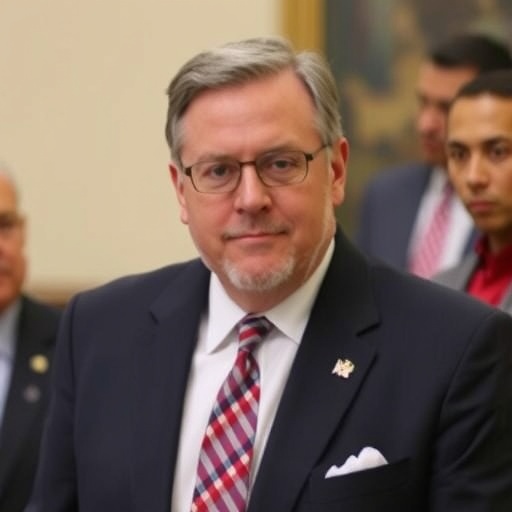Jack Smith Urges Congress for Open Hearings on Trump Investigations to Boost Transparency
In a bold move that could reshape the narrative around one of the most contentious chapters in American politics, former Special Counsel Jack Smith has formally requested to testify in open hearings before the House and Senate Judiciary Committees. This unprecedented call for transparency comes as lingering questions swirl around the high-profile investigations into former President Donald Trump, including probes into classified documents and efforts to overturn the 2020 election results. Smith’s request, detailed in a letter to congressional leaders, underscores a push to lift the veil on decisions that have fueled national division and legal battles.
Smith, who led the Justice Department’s scrutiny of Trump’s actions until his resignation following the 2024 election, argues that public testimony is essential to clarify the scope, findings, and procedural integrity of the Trump investigation. With Trump now back in the White House, the timing of this request amplifies its potential impact, raising stakes for accountability and partisan clashes in Congress.
Smith’s Letter Ignites Calls for Unrestricted Testimony
The catalyst for this development is a meticulously crafted letter from Jack Smith, dated October 15, 2024, addressed to the chairs and ranking members of the House Judiciary Committee and the Senate Judiciary Committee. In the document, Smith explicitly requests open, public hearings rather than closed-door sessions, emphasizing that ‘the American public deserves a full accounting of the facts without the distortions of secrecy.’ This stance marks a departure from the typically insulated nature of special counsel proceedings, where much of the work unfolds behind classified barriers.
Legal experts note that Smith’s initiative aligns with growing demands for oversight in an era of polarized politics. ‘This is a rare instance where a special counsel is proactively seeking the spotlight to defend their legacy,’ said Barbara McQuade, a former U.S. Attorney and MSNBC legal analyst. McQuade highlighted that the letter references specific aspects of the Trump investigation, such as the handling of over 300 classified documents at Mar-a-Lago and the January 6, 2021, Capitol riot-related inquiries, which resulted in multiple indictments before being paused post-election.
Under Smith’s tenure, the Trump investigation amassed a trove of evidence, including witness testimonies from over 1,000 individuals and forensic analyses of digital communications. Statistics from the Department of Justice reveal that the probe involved more than 500 subpoenas and cooperation from international allies, underscoring its global reach. Yet, with Trump’s return to power, many fear that ongoing cases could be derailed, making Smith’s plea for hearings a preemptive strike for historical record-keeping.
Unpacking the Core Probes in the Trump Investigation
At the heart of Jack Smith’s request lies the multifaceted Trump investigation, which spanned two primary lanes: the classified documents case and the election interference probe. The former centered on Trump’s alleged retention of sensitive materials at his Florida estate, leading to a 37-count indictment in June 2023. Court filings detailed how FBI searches uncovered items from nuclear programs and defense capabilities, prompting debates over national security risks.
The election-related arm delved into Trump’s efforts to challenge the 2020 results, including pressure on state officials and the fake electors scheme. This resulted in four criminal counts, with evidence drawn from audio recordings, emails, and sworn statements. A landmark moment was the August 2023 indictment, where Smith accused Trump of conspiring to defraud the United States—a charge that echoed Watergate-era precedents.
Throughout these efforts, the Judiciary Committees have played pivotal roles. The House Judiciary Committee, under Democratic leadership in prior sessions, held extensive hearings on related matters, subpoenaing figures like former White House counsel Pat Cipollone. Now, with Republican majorities in both chambers post-2024, dynamics have shifted. Smith’s request specifically targets these committees, citing their constitutional mandate under Article I to oversee executive actions.
Quotes from key players add layers to the story. In his letter, Smith stated, ‘Transparency is not optional in a democracy; it’s the bedrock of trust.’ Conversely, House Judiciary Chair Jim Jordan (R-Ohio) responded cautiously, tweeting, ‘We’ll review Mr. Smith’s request, but Congress won’t be a stage for partisan theater.’ This exchange hints at the hearings’ potential to become a battleground for ideological warfare.
Congressional Hurdles and Partisan Divide Over Hearings
Navigating the labyrinth of congressional procedure, Jack Smith’s bid for open hearings faces a gauntlet of political obstacles. The House Judiciary Committee, chaired by Jordan, has historically been a Trump ally, launching investigations into the ‘weaponization’ of the DOJ against conservatives. Senate Judiciary Chair Lindsey Graham (R-S.C.) has similarly voiced skepticism toward special counsel probes, once calling Smith’s appointment ‘a witch hunt.’
Yet, bipartisan voices emerge. Senate Minority Leader Chuck Schumer (D-N.Y.) praised the request, saying, ‘This is an opportunity for truth-telling that Congress cannot ignore.’ Democrats on the committees, including Rep. Jamie Raskin (D-Md.), have signaled readiness to co-sponsor resolutions for the hearings, potentially forcing a vote as early as next month.
Procedurally, open hearings require committee approval, followed by scheduling amid a packed legislative calendar. Historical data from the Congressional Research Service shows that special counsel testimonies, like Robert Mueller’s 2019 appearance, drew over 10 million viewers, amplifying their influence. If approved, Smith’s sessions could span multiple days, with prepared statements, Q&A, and possible subpoenas for additional witnesses.
Challenges abound: Republicans may demand reciprocal testimonies from Trump administration officials, turning hearings into a tit-for-tat spectacle. Legal scholars warn of contempt risks if Smith withholds classified details, balancing transparency with security. A 2023 Government Accountability Office report estimated that similar oversight hearings cost taxpayers upwards of $2 million, factoring in security and transcription—costs that critics like Sen. Rand Paul (R-Ky.) decry as wasteful.
- Key Hurdles: Partisan gridlock in approving the hearings.
- Potential Allies: Bipartisan reform advocates pushing for ethics oversight.
- Risks: Leakage of sensitive information during public sessions.
Broader Implications for Accountability and National Politics
Beyond the immediate procedural drama, Jack Smith’s request reverberates through the corridors of power, potentially influencing legal precedents and electoral landscapes. For the Trump investigation, open hearings could preserve evidence trails, deterring any executive attempts to pardon associates or bury files. Civil liberties groups like the ACLU have lauded the move, with executive director Anthony Romero stating, ‘This ensures that no one is above the law, regardless of political winds.’
In the context of the 2024 election aftermath, where Trump secured a narrow victory, these hearings might fuel narratives of a ‘deep state’ versus democratic safeguards. Polling from Pew Research in September 2024 indicated that 58% of Americans believe the Trump probes were politically motivated, while 42% viewed them as necessary accountability. Smith’s testimony could sway public opinion, especially among independents who prioritize transparency.
Looking ahead, the Judiciary Committees’ handling of this request sets a template for future special counsel engagements. If successful, it could normalize public reckonings for high-stakes investigations, from foreign election meddling to cyber threats. Conversely, denial might erode faith in institutions, echoing post-Watergate cynicism.
As committees deliberate, whispers of compromise circulate—perhaps hybrid sessions with redacted portions. International observers, including EU justice ministers, watch closely, given the probes’ ties to NATO secrets. Ultimately, this saga underscores Congress’s role as a check on executive overreach, with Smith’s voice potentially echoing for generations.
Stakeholders anticipate initial responses by mid-November, with full hearings possibly convening in early 2025. The path forward hinges on whether lawmakers prioritize facts over factionalism, offering a litmus test for American democracy’s resilience.








